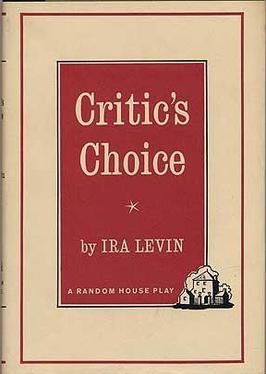Script Suggestions II: ‘Critic’s Choice’ by Ira Levin

Welcome back to the new Script Suggestion Series; I’ve recently pulled another play off of my ever-growing shelf, so now it’s time to introduce it to you, our readers, and share a few thoughts on the piece. The most difficult thing about having hundreds of options for what to review is that you have to choose one, so you force yourself to come up with small justifications of why one script is worthier of the attention than the next. Last time, I chose The Crackwalker by Judith Thompson for its connection to Kingston; my reasons for selecting today’s subject are strictly self-indulgent, because what critic could resist the wordplay of choosing a piece titled Critic’s Choice?
Warning: This article contains some spoilers for ‘Critic’s Choice.’
Critic’s Choice by Ira Levin is fuelled by beautiful spite. Before even reaching the cast list of my copy, I came across a Walter Kerr quotation from his book How NOT to Write a Play which reads: “I sometimes have visions of a gag conference in which that slick character who is traditionally known as Manny bounces in, eyes ablaze, and bubbles over with: ‘Listen. This guy’s a dramatic critic, see? So his wife writes a play. He’s got to review the play. Take it from there.’” (Levin 5) Levin must have taken this as a challenge, because that is exactly the plot of this script. The play follows Parker Ballantine, a famous New York theatre critic, as his marriage to Angela hits a rough patch after she decides to write her first play. On the surface, it seems a common domestic comedy, but upon further examination, the play contains so much more.
By including a direct quotation from Kerr’s book, Levin makes readers aware of his playful malice early in the writing, and continuously drops additional jabs throughout the piece. When Angela first announces that she intends to write a play, Parker decides to write a book with a title which hilariously references Kerr’s: “Don’t Write That Play.” Levin uses scene changes to mock him further; they often feature Parker dictating his novel into a recorder, allowing the audience to hear his opinions on amateur playwriting.
One of the finest jokes of the play stems from one of these moments, with Parker complaining about the use of telephone acting to convey exposition. Levin then uses this observation to mock his own writing, by having multiple characters provide exposition over the phone in the second act of the play. This kind of humour left me at a loss for how to provide a critique of the piece; through Parker and Kerr, Levin identifies tropes of lousy writing then immediately weaves these issues into his own script. The metatheatricality of the gag is laughable, but the deliberate flirtation with lousy writing treads a dangerous line between intelligent humour and becoming just as irritating and played out as Parker deems it.
Despite the moments of intentional mediocrity, Levin’s strength as a writer is clear in the script. While I am not familiar with his other writings, I have heard nothing but wonderful things about him as a horror author (having written Rosemary’s Baby), and while this piece is no horror, it does showcase his strength in writing characters who are psychologically complex. The final act takes a shift from domestic comedy to drama as we see Parker grapple with his responsibility to the public as a theatre critic, and his dedication and love for his wife.
This shift in tone is perhaps what I most admire about the show. From the very first page, I expected the grand finale to be something along the lines of “I underestimated you darling, your play was phenomenal! I’m so sorry I ever doubted you.” With a comedy, it’s the easy solution: it provides a happy ending to the characters and leaves the audience with a nice theme against superiority complexes. In reality though, Angela’s play stays miserable and gets worse as the show goes on, and Parker writes an awful review for it. Rather than the easy to follow theme I had expected, I left the script legitimately impressed that I had to dig for the meaning of this deceptively simple comedy. There isn’t a happy ending either, the lovers do reunite, but there are hints of doubt in the tone as to whether or not they will continue to make their relationship work.
The themes I ended up finding the most prevalent are honesty and experience. Early on in the piece, Parker tells his son: “Sometimes you have to hurt people. Even people you love…. If I lie about [Angela’s] play… I’m going to lose a good-size piece of my self-respect. Maybe a piece of my self-respect sounds tiny compared to hurting Angie, but if I start disliking myself a little, I’m going to start disliking the whole world a little, Angie included.” (Levin 26-27) This sentiment ends up being the hill Parker would choose to die on, but seeing the strain it leaves on his relationship, I still am prone to questioning it. Experience comes to mind because in some ways, Parker was correct about someone writing a play for the first time. Levin respects his own craft too much to leave the audience thinking anyone can do it. Contrarily, Levin also takes regular jabs at Kerr, showing he clearly does not believe anyone should avoid writing. I think what Levin really hammers home with this piece is that you should never let someone stop you from writing, but you also need to respect the craft enough to recognize that it takes practice.
As I had hoped, Critic’s Choice was a very interesting script to delve into, although not for the reasons I had expected. I found myself reflecting on my time as a critic in Kingston throughout the entire read; whether I should have been more or less honest and blunt on occasions. But more than that, I found myself thinking how fortunate we are to have so much new work in Kingston. With the DAN Studio Series at Queen’s, the Come Play By The Lake Festival at Domino Theatre, and every summer with the TK Fringe, we have a city with a small but mighty theatre community that does its best to provide endless opportunities for old and new playwrights to test their work. It’s not always perfect, but people are always writing, and that’s how it should be.
Thanks for reading, and keep an eye out for the next one… my shelf still has a few hundred scripts for us to look at, and while I am not venturing to cross off every title, I hope I can hold your attention for a few more.
Levin, Ira, Critic’s Choice, Dramatists Play Service, 1962.
If you would like to purchase a copy of ‘Critic’s Choice’ by Ira Levin for yourself, you can find the script published by Dramatists Play Service here.
